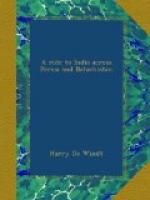The Zil-i-Sultan returned to Ispahan before I left. He is rightly named “Shadow of the King,” for, saving his somewhat more youthful appearance, he is as like Nasr-oo-din as two peas. Like his father in most of his tastes, his favourite occupations are riding, the chase, and shooting at a mark; but he is, perhaps, more susceptible to the charms of the fair sex than his august parent.
The prince is now nearly forty years of age. His wife, daughter of a former Prime Minister of Persia, who was strangled by order of the present Shah, died a few years ago, having borne him a son, the “Jelal-u-dowleh,” a bright, clever boy, now about eighteen years old, and three daughters. The Zil-i-Sultan is adored by his people, and has, unquestionably, very great influence over the districts of which he is governor. Within the last two years, however, at least two-thirds of his possessions have been taken from him—a proceeding that caused him considerable annoyance, and drew forth the remark that the Valliad would one day regret it. There can be little doubt that, at the death of Nasr-oo-din, the Governor of Ispahan will make a bold bid for the throne; in fact, the latter makes no secret of his intentions. Drink and debauch having already rendered his younger brother half-witted, the task should not be a difficult one, especially as half the people and the whole army side with the illegitimate, though more popular, prince. It is, perhaps, under the circumstances, to be regretted that the latter is an ardent Russophile, ever since his Majesty the Czar sent a special mission to Ispahan to confer upon him the Order of the Black Eagle. Should the Zil-i-Sultan succeed Nasr-oo-din, British influence in Persia may become even less powerful than it is now, if that is possible.
The Zil-i-Sultan is far more civilized in his habits and mode of life than the Shah. A fair French scholar, he regularly peruses his Temps, Gil Blas, and the latest works of the best French authors. It is strange that, with all his common sense and sterling qualities, this prince should, in some matters, be a perfect child. One of his whims is dress. Suits of clothes, shirts, socks, hats, and uniforms are continually pouring in from all parts of Europe, many of the latter anything but becoming to the fat, podgy figure of the “King’s Shadow.” A photograph of his Royal Highness the Duke of Connaught in Rifle Brigade uniform was shown him a couple of years since. The Court tailor was at once sent for. “I must have this; make it at once,” was the command, the humble request to be allowed to take the measure being met by, “Son of a hell-burnt father! What do you mean? Make it for a well-made man—a man with a better figure than that, and it will fit me!”




